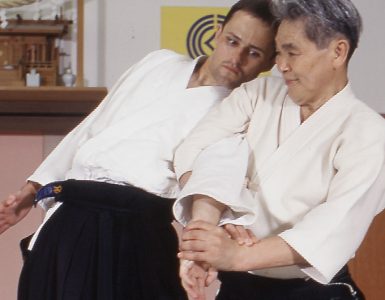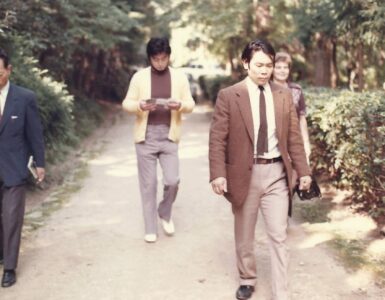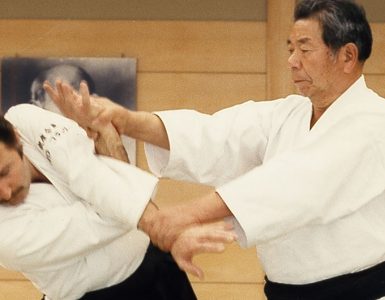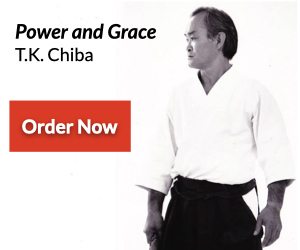The following translation from the Japanese-language autobiography entitled Aikido Jinsei (An Aikido Life) by Gozo Shioda Sensei of Yoshinkan Aikido is published with the kind permission of the author and the publisher, Takeuchi Shoten Shinsha. This series of installments began with AIKI NEWS No. 72. Read part five here.
The Path I Have Walked
What I have written here is a true account of my life beginning with my childhood. I feel embarrassed at how directionless and naive I was especially before and during the war. However, I thought that by painting a true picture of myself this would enable the reader to appreciate to what extent my father and Munetaka Abe Sensei, the headmaster of the 6th Middle School, understood my character at such an early stage and encouraged me to enter the world of Aikido.
Chapter 1: My Childhood
A Sickly Child
I was born on September 9, 1915 at 29 Oban-cho, Yotsuya Ward, Tokyo (present Daikyo-cho 18-4, Shinjuku) as the second son of Seiichi Shioda, a pediatrician. I was brought up in a happy family under the protection of gentle parents. However, I was very sickly as an infant and I think I survived only because my father was a doctor. I caught pneumonia five times and fell ill with such diseases as scarlet fever, diphtheria, and probably everything else but the plague and cholera. I apparently spent a lot of time in bed.
Nonetheless, starting from around the time I was in the fifth grade I became quite healthy. Gradually I gained stamina and ended up becoming quite strong. You might say that this was because I had been the victim of all sorts of illnesses and had had enough of them.
I was an early riser getting up at four every morning. I liked dogs very much and at one point had 21 of them. There were about 11 male servants in our employ and, indulging my selfish wish, I and the servants would take the dogs out and run one lap around Yoyogi no hara (present-day NHK, Yoyogi Park) and return home about two hours later. After I led the dogs back to the dog house and fed them, I had breakfast and went to my elementary school (the 6th Yotsuya Elementary School). It is located near Keio Hospital near Shinanomachi.
Practice In My Father’s Dojo
My father was interested from an early stage in educating young people and remodeled one corner of the house into a dojo since his idea was that martial arts were the only means to achieve this purpose. He called the dojo the “Yoshinkan.” This was the predecessor of the Yoshinkan we have today. He hired teachers of judo and kendo to come to the dojo. Onuma Sensei, a Judo Instructor of the Yotsuya Police Station and Shiina Sensei, a kendo instructor of the Hisamatsu Police Station were invited to teach judo and kendo respectively. Mr. Shiina later became a kendo instructor in Taiwan. My father welcomed not only his students but also his patients and children from the neighborhood to practice judo and kendo at his dojo. He, of course, didn’t receive money for this. When I was an elementary school student my father told me to practice kendo and so I devoted myself to training in this art. When I reached a higher grade of elementary school I decided to enter the 6th Prefectural Middle School (present-day Shinjuku High School) and began studying seriously. I had two home tutors with me who helped me with my studies day and night. It was thanks to them I was able to enter this school.
The headmaster of the high school at that time was Munetaka Abe Sensei, a man of noble character and a patriot. He always used to say: “Studies are certainly important but a young man should always have a dream and try to become useful to others.” There was a “national bell” which used to be placed atop the mast of the Battleship Mikasa at the time of the Russo-Japanese War and which was presented as a gift to the school yard. Abe Sensei would strike this bell in the morning gathering of students and repeat the emperor’s “tanka” poem three times. His most favorite poem read: “How I wish to have the brilliance of this clear blue sky in my own mind.” He loved to recite this poem in a loud voice. All of the students of the school respected Abe Sensei.
Entrance Examination For Military Preparatory School
Parenthetically, although the percentage of students entering the First High School from my school at that time was less than that of the Itchu (former 1st Middle School) and Yonchu (former 4th Middle School) schools, the percentage of students entering the Army and Navy Military School was the highest in Japan. Having entered such a middle school I felt full of energy both mentally and physically. One day my father called me and said: “Gozo, you are going to study hard from now on and enter the Military Preparatory School.” In those days it was very difficult to get into this school. Only about 50 out of one thousand applicants were allowed to enter. Unless you were quite outstanding it was impossible to gain entry. I personally disliked studying and so having to prepare for the entry examination was a very severe and painful experience. I think it was probably during this period when I studied the most in my life. You had to enter this Military Preparatory School when you were in the first or second year of middle school.
I was an early riser getting up at four every morning. I liked dogs very much and at one point had 21 of them. There were about 11 male servants in our employ and, indulging my selfish wish, I and the servants would take the dogs out and run one lap around Yoyogi no hara (present-day NHK, Yoyogi Park) and return home about two hours later. After I led the dogs back to the dog house and fed them, I had breakfast and went to my elementary school (the 6th Yotsuya Elementary School). It is located near Keio Hospital near Shinanomachi.
When I became a second year student, I submitted a one-year notice of absence to my school. During that time, two private tutors sat with me. One of them helped me with mathematics and the other with the Japanese language and other subjects. I studied about 12 or 13 hours a day. Fortunately or unfortunately, I was placed on a waiting list after having taken the examination.
At that time my father had many friends and acquaintances among military officers including a Major Yamada who was the head of the Military Preparatory School. My father asked me if I wanted him to talk to Major Yamada on my behalf but I insisted that I would try by myself and not use his influence. After the examination, Major Yamada learned that the son of Doctor Shioda had participated and came to my father to suggest that I be allowed to enter the school. However, I decided to go my own way and returned to the 6th Middle School making a new start as a second-year student. It was then that I became a classmate of Mikio Takahashi who later became the head of the Metropolitan Police Office.
Immersion In Judo Practice
In reaction to my period of intensive academic study I then began to involve myself in developing physical strength. As I mentioned earlier, I began practicing judo at the Yoshinkan dojo built by my father. In those days a student had to choose either judo or kendo as taking one of them was compulsory. I practiced kendo in the dojo in my home when I was an elementary school student but decided to choose judo in middle school. Since I had practiced judo at home, I never lost in judo competition among friends in the same year at school. Each grade had 6 classes divided into A, B, C, D, E, and F groups. There was an All-Class Judo Tournament held once a year and the winning class would receive an official commendation. One time I participated in the competition as the leader of my class and beat all of my opponents from the other classes winning the tournament. My class was D and it was almost always the D class which would win.
The headmaster of the high school at that time was Munetaka Abe Sensei, a man of noble character and a patriot. He always used to say: “Studies are certainly important but a young man should always have a dream and try to become useful to others.” There was a “national bell” which used to be placed atop the mast of the Battleship Mikasa at the time of the Russo-Japanese War and which was presented as a gift to the school yard. Abe Sensei would strike this bell in the morning gathering of students and repeat the emperor’s “tanka” poem three times. His most favorite poem read: “How I wish to have the brilliance of this clear blue sky in my own mind.” He loved to recite this poem in a loud voice. All of the students of the school respected Abe Sensei.
My Father
Here I would like to talk about the kind of person my father was. It seems that he was a noted pediatrician. He was well-known as a specialist in infant dysentery and it seemed that the patients who stood in line before the gate of our home every day could fill a marketplace. There were so many people that street stalls including toy shops lined up in the area of my house in Oban-cho. He had consultation hours in the morning and made house calls in the afternoon and in the evening one caller after another came to visit him and he would have large parties with them. Among the visitors was Eitaro Hata who became a commander of the Kanto Army. His younger brother, Shunroku Hata (later to become a Minister of War and supreme commander of an expeditionary force to China) as well as the well-known Messieurs Hideki Tojo, Jiro Minami, Kazunari Ugaki and Kuniaki Koiso all came as guests in later years. Among the naval officers, Admiral Tomosaburo Kato (chief of staff during the Russo-Japanese War) and many young officers came to visit my father. Among the politicians were Count Keigo Kiyoura, Count Shimpei Goto and Minoru Toyama. Businessman friends who often visited my father were Eiichi Shibusawa, Kyohei Magoshi and Kihachiro Okura. On my father’s birthday, December 22, all of these noted people from various levels of society visited my father. Very often the number of visitors was over 300.
In those days a national priority was the development of Manchuria and Mongolia. The army especially pushed ahead with the build-up of Manchuria. Japan’s policy was to create a foothold for the establishment of a Japanese Manchuria and Mongolia by setting up the Manchukuo Empire with the last emperor of the Ch’ing dynasty, Pu-yi as the monarch. During this turbulent period, the headmaster Mr. Abe felt that young people should adventure into the continent and actively participate in the cultivation of Manchuria and Mongolia. Then, they should work “for the sake of Japan.” My father also worked for the establishment of Manchuria. He was especially interested in the family of the imperial prince Shuku Aishinkakura and had close contacts with its members. The younger brother of the emperor, Fuketsu married Hiroshi, the daughter of Marquis Saga in 1937 and my father acted as the go-between for the marriage. The younger brother of the Princess was Mr. Junki and three brothers of the family of the imperial prince—Kengen (a student of the Military Staff College), Ken’yo (a student of the Economics Department of Kyoto Imperial University) and Kento (a student) of the 6th Prefectural Middle School)—were the younger brothers of Yoshiko Kawashima, known as the “Matahari [German spy in France during WWI] of the East.”
In reaction to my period of intensive academic study I then began to involve myself in developing physical strength. As I mentioned earlier, I began practicing judo at the Yoshinkan dojo built by my father. In those days a student had to choose either judo or kendo as taking one of them was compulsory. I practiced kendo in the dojo in my home when I was an elementary school student but decided to choose judo in middle school. Since I had practiced judo at home, I never lost in judo competition among friends in the same year at school. Each grade had 6 classes divided into A, B, C, D, E, and F groups. There was an All-Class Judo Tournament held once a year and the winning class would receive an official commendation. One time I participated in the competition as the leader of my class and beat all of my opponents from the other classes winning the tournament. My class was D and it was almost always the D class which would win.
During that time, the family of the imperial prince had Yoshiko Kawashima marry Ganjurujappu, the elder son of Papuchappu, a powerful figure in Mongolia, in order to get closer to the country and enter into a matrimonial relation with them. On the one hand, a certain Chosakurin and his son, Chogakuryo, were eagerly awaiting a chance to invade Manchuria. On the other hand, General Papuchappu sent his army to China in order to subjugate Chogakuryu. However, the goddess of victory did not favor him and his troops were ignominiously defeated by Chogakuryo’s army. I learned about what happened in this battle later on. It seems that since the General was riding on a white horse at the head of the troops he was the first one to be shot. He was drenched in blood and his white horse was stained red and the General died while still mounted. I was told he was a great and courageous man. He had three children, two boys and a girl. The family ordered his children arrested and placed a price on their heads intending to have them executed.
Caring For The Orphaned Mongolian Children
These three children came to Japan as exiles. The oldest son was called Ganjurujap, the second son, Jonjurujap and a daughter Doruhichichiku. The oldest son entered the Military Staff College and the second son the Military Academy. However, my father gave the daughter Doruhichichiku a Japanese name, Akiko Tanaka, and cared for her in our home. He had her enter Miwada Girls High School. If I remember correctly she was about 13 years old, three years younger than me, when she came to Japan. Somehow I found her cute and liked her. Precocious little boy that I was, this may have been my first love.
My father had many young people stay in his house and paid their educational expenses in order to cultivate able youth for the future of Japan. Although his income was several times more than those of others, his expenses were also high. It seems he spent two or three thousand yen each month (about 1935). Although this happened later, when Jon (Jonjurujap) graduated from the Military Staff College becoming a staff officer and colonel in the Mongolian army, my father had an ordinance factory manufacture artillery (amounting to about 30,000 Yen) and presented it to Jon. This was possible since General Eitaro Hata was at that time an artillery inspector.
Moreover, my father never accepted money or articles from the poor because he felt that medicine was a benevolent art. However, it seems he received a lot from the rich. My father was of such a nature that he appeared able to carry through whatever he thought was good while being completely free and easy with everyone. I was really fortunate to have been brought up in such a family. However, when I began to reflect on myself in later years, I realized that I used to harbor the illusion that I had become a great man. I was like a small man acting arrogantly using borrowed authority and depending too much on others. You could say I was living in too comfortable a family environment.













Add comment